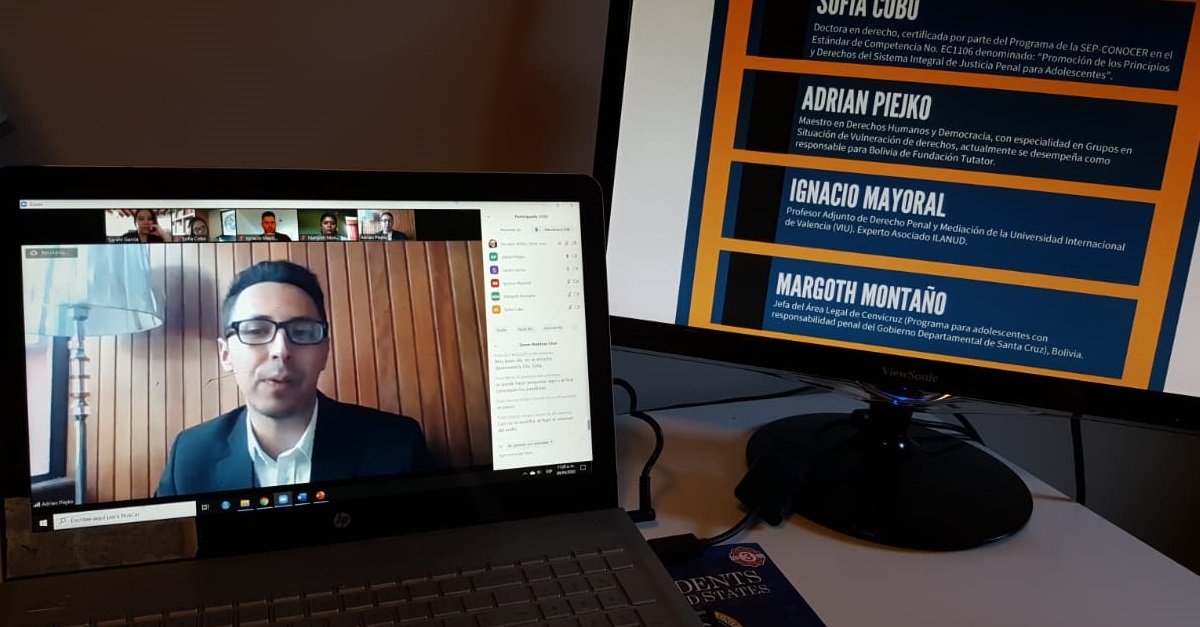Adolescents do not perceive freedom in the same way that we do, which is why in the face of a pandemic like that of COVID-19, we have to see not what we think they need, but what they really see as essential, according to Margoth Montaño,Head of the Cenvicruz Legal Area (Program for adolescents with criminal responsibility of the Departmental Government of Santa Cruz), Bolivia.
This opinion was given during our third webinar entitled: “COVID-19: Humanitarian crisis of children detained in Latin America”, where we were able to hear different voices from experts who work with adolescents in conflict with the law from various parts of the continent.
During this event, Sofia Cobo, Doctor of Law certified by the SEP-CONOCER Program in Competition Standard No. EC1106 called: “Promotion of the Principles and Rights of the Comprehensive Criminal Justice System for Adolescents,” said that in a public health emergency situation such as the one that is occurring worldwide, the main consequences in young people derived from the pandemic must be analyzed from the paradigm that it does not affect all people in the same way.

Said opinion was shared by Ignacio Mayoral, adjunct Professor of Criminal Law and Mediation at the International University of Valencia (VIU), who added that equal solutions for all do not work, which is why specific cases have to be addressed specifically, so that everyone can count with the essentials during an emergency situation such as that of the Coronavirus.
Adrian Piejko, Master in Human Rights and Democracy, specializing in Groups in a Situation of Violation of rights, currently works as head of the Tutator Foundation for Bolivia. He explained for his part that beyond the pro-freedom principle, in most cases it is an excellent opportunity to pursue juvenile criminal justice goals based on reintegration and dialogue.

The event was moderated by the National Director of Projects of JJAI, Sarahi García, who closed the conversation with two fundamental ideas: justice does not mean internment and if supervision in freedom was strengthened, it would not be so difficult to imagine being able to decongest the system and that more adolescents would be able to be with their families during the pandemic.
During the event, it was recalled that Juvenile Justice Advocates International (JJAI) recommends the following to system operators:
- Suspend the imposition of precautionary measures involving deprivation of liberty;
- Provide parole to or probation when applicable to:
- Teens with a medical condition;
- Pregnant adolescents;
- Adolescents with measures of semi-internment or internment during free time and replace it with home internment;
- Adolescents with less than 6 months of time left in their custodial sentence
- Postpone or change sanctioning measures of deprivation of liberty in adolescent cases with non-deprivation of liberty precautionary measures.
This activity is the third in a series that we will be carrying out with experts in the area. For more information you can follow us on our social networks, or write to us at info@jjadvocates.org.
It is worth mentioning that the Inter-American Commission on Human Rights (IACHR) has a publication entitled: “Principles and Good Practices on the Protection of Persons Deprived of Liberty in the Americas,” where it explains the general principles and those relating to conditions of deprivation. of freedom, which can be consulted here.

